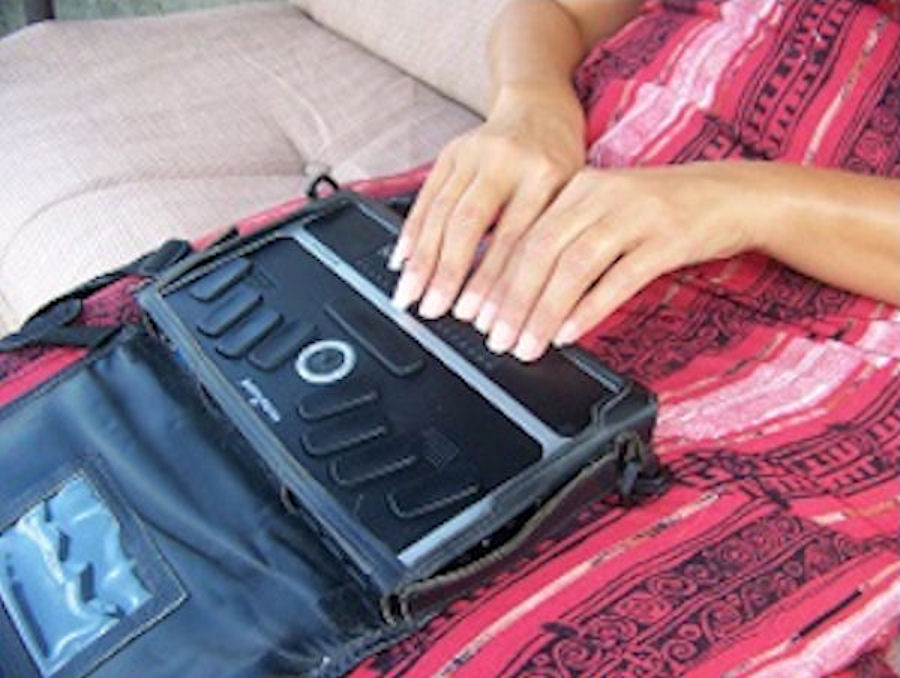
Technology has helped to improve my life in many ways. Talking products such as alarm clocks, thermometers, scales, caller ID, and mp3 players have helped to simplify my life. Additionally, more sophisticated devices with built-in Braille displays have allowed me as a visually impaired person to experience the benefits of personal computing. Technology has greatly increased the quality of my life and made me extremely independent.
Yet someone could throw all the technology in the world at me, and it would not be useful if all they saw was my blindness. Sighted people more often than not make assumptions and decisions about the needs of the blind. Many believe they know our requirements and capabilities before they even ask us questions about how we do things or what adaptations might be made, if we cannot function optimally in a particular situation.
I have used so many different talking gadgets. However, the piece of assistive technology I cannot bear to be without is my Apex – a very powerful, portable notetaker with a built-in Braille display. I am a totally blind Braille reader who only tolerates synthesized speech when I am forced to use my laptop with a screen reader for tasks I cannot do with the Apex.
I use the Apex for hours every day because, with its built-in Braille display for output and Braille keyboard for input, I can work more efficiently just as a sighted person reads and writes print. The Apex is also intuitively designed for the blind, making it much easier to use than a regular computer because one doesn’t have to learn a complicated set of commands to control the Braille display or speech. I use the Apex to surf the web, email, read books, take notes, maintain my list of contacts, keep track of my finances, and much more. In fact, I am using my Apex to write this article.
I use my laptop when I must visit websites that are not accessible with the Apex. This often happens when I need to do online shopping, stream videos, attend webinars, and use Skype.
My pocket-size Victor Stream talking mp3 player is helpful when I want to listen to podcasts or music on the go and would otherwise be unable to locate the specific files I want to hear.
A major challenge blind people face is the full or partial inaccessibility of websites and programs that do not work well with Braille displays and screen readers because of too many graphics. When no audio challenge is available, Captcha is another insurmountable challenge. The pace of change is so rapid, that it seems to me that companies that design the hardware and update the software for assistive technology simply cannot keep up. More often than I would like to admit, I am forced to ask for assistance from a sighted person, call a company if there is a phone number listed, or forget about doing whatever I had planned to accomplish online.
Another significant obstacle facing the blind is the prohibitive cost of assistive technology. Unfortunately, the vast majority of people who are considered legally blind, which encompasses a fairly wide range of visual acuity, are economically disadvantaged due to extremely high levels of unemployment and underemployment. An even greater financial burden falls upon those who rely on Braille displays. The Braille displays cost far more than a simple screen reader with synthesized speech that can run on virtually any computer and which can now, in some cases, be obtained free of charge. Imagine paying an extra 1500–2000 for a computer screen because you don’t want to listen to an automated voice but would rather read because it improves your efficiency. Consider how much this discourages Braille literacy and the negative impact on our entire society as our children are learning to rely on tools like spellcheck rather than learning to spell.
I believe the fact that the population of blind people is a minority is one of the major reasons our technology needs are not always met. Some people are not aware of what we need when they are creating websites and programs. When it comes to purchasing assistive technology, we face the law of supply and demand. Though I am grateful for the technology I use every day, only time will tell whether the situation will improve.
Author
Mindy Hartman is a vocalist, narrator, and blindness educator. Her company is Out of Sight Ministries, PO Box 701, Chambersburg, PA 17201. Email: outofsightministries@comcast.net.







 JOIN SSIT
JOIN SSIT